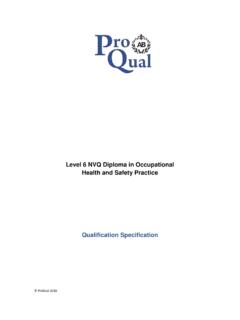Transcription of NHS Outcomes Framework - GOV.UK
1 The NHS Outcomes Framework 2015/16 December 2014 Title: The NHS Outcomes Framework 2015/16 Author: NHS Group, Department of Health FN-NHSG-NHSCPS-17185 Document Purpose: PolicyPublication date: December 2014 Contact details: NHS Outcomes Framework , NHS Group, Department of HealthRoom 234, Richmond House79 WhitehallLondon SW1A may re-use the text of this document (not including logos) free of charge in any format or medium, under the terms of the Open Government Licence. To view this licence, visit Crown copyright Published to , in PDF format only.
2 2 Background 3 Assessing NHS England s progress using the NHS Outcomes Framework 5 Clinical Commissioning Group Outcome Indicator Set 5 Reviewing the NHS Outcomes Framework 6 Review process for the NHS Outcomes Framework 2015/16 6 Next steps on the NHS Outcomes Framework 6 Changes across each domain 7 Domain 1 8 Domain 2 10 Domain 3 12 Domain 4 15 Domain 5 17 NHS Outcomes Framework at a glance 192 The NHS Outcomes Framework 2015/16 Introduction1.
3 The NHS Outcomes Framework , alongside the Adult Social Care and Public Health Outcomes Frameworks, sits at the heart of the health and care system. The NHS Outcomes Framework : provides a national overview of how well the NHS is performing; is the primary accountability mechanism, in conjunction with the mandate, between the Secretary of State for Health and NHS England; and improves quality throughout the NHS by encouraging a change in culture and behaviour focused on health Outcomes not process. 2. The NHS Outcomes Framework was developed in December 2010, following public consultation, and has been updated annually.
4 Refreshing the NHS Outcomes Framework allows it to become a tool which reflects the current landscape of the health and care system, and to be better suited to approach the many challenges that the system faces. 3. This document sets out the updated NHS Outcomes Framework for 2015/16. It is being published alongside the mandate to NHS England for 2015/16. It is also accompanied by a Technical Appendix which provides detailed information about the indicators still being developed for the This year s refresh of the NHS Outcomes Framework is on a larger scale than previous years.
5 As part of this review we engaged with stakeholders over the summer, and have published a summary of what we heard and the Department s response alongside this document. Background 3 Background5. The NHS Outcomes Framework is a set of 68 indicators which measure performance in the health and care system at a national-level. It is not intended to be an exhaustive list of health indicators. Rather, it has been designed to be a set of Outcomes that together form an overarching picture of the current state of health and care services in England.
6 This also means that the NHS Outcomes Framework must remain parsimonious so as not to undermine the rationale for the Framework , as a whole, in providing a focus for accountability and improvement. 6. Indicators in the NHS Outcomes Framework are grouped into five domains, which set out the high-level national Outcomes that the NHS should be aiming to improve. For each domain, there are a small number of overarching indicators followed by a number of improvement areas. Overarching indicators are designed to cover the domain as broadly as possible.
7 Improvement area indicators are included to target those groups not covered by the overarching indicators and/or where independent emphasis is merited. 7. These improvement areas include both sub-indicators (for Outcomes already covered by the overarching indicators but meriting independent emphasis), and complementary indicators (extending the coverage of the domain). They focus on improving health and reducing health inequalities:Domain 1 Preventing people from dying prematurely;Domain 2 Enhancing quality of life for people with long-term conditions;Domain 3 Helping people to recover from episodes of ill health or following injury;Domain 4 Ensuring that people have a positive experience of care; andDomain 5 Treating and caring for people in a safe environment and protecting them from avoidable The NHS Outcomes Framework 2015/168.
8 Each year since the NHS Outcomes Framework was first published in 2010, the Department of Health has been improving the Framework by refining existing indicators and developing new indicators. These changes have helped improve the scope and coverage of the NHS Outcomes Framework , alignment with the mandate to NHS England,1 and alignment with the two other Outcomes frameworks the Public Health Outcomes Framework (PHOF)2 and the Adult Social Care Outcomes Framework (ASCOF).3 9. The Public Health Outcomes Framework and the Adult Social Care Outcomes Framework reflect the different delivery systems and accountability models for public health and adult social care but have the same overarching aim of improving the Outcomes that matter to people.
9 The Department continues to work to align the frameworks to encourage collaboration and integration, both in terms of how shared and complementary indicators are presented across all three frameworks, and through an increased and more systematic use of shared and complementary These three Outcomes frameworks are supported by Education Outcomes , which set the education and training Outcomes for the health and care system as a whole. Education Outcomes have an enabling role across the whole system and aim to measure progress in education, training and workforce development and the consequential impact on the quality and safety of services for patients and service NHS England s progress using the NHS Outcomes Framework 5 Assessing NHS England s progress using the NHS Outcomes Framework11.
10 The NHS Outcomes Framework forms an essential part of the way in which the Secretary of State for Health holds NHS England to account. It has been designed to be the primary assurance mechanism to assess the progress of NHS England at a national level, meaning that the limited number of indicators and the type of data collected by them must represent the NHS service users, and the challenges faced by the NHS, as effectively as As a part of this, the NHS Outcomes Framework plays a key role in assessing progress against the mandate to NHS England.
















